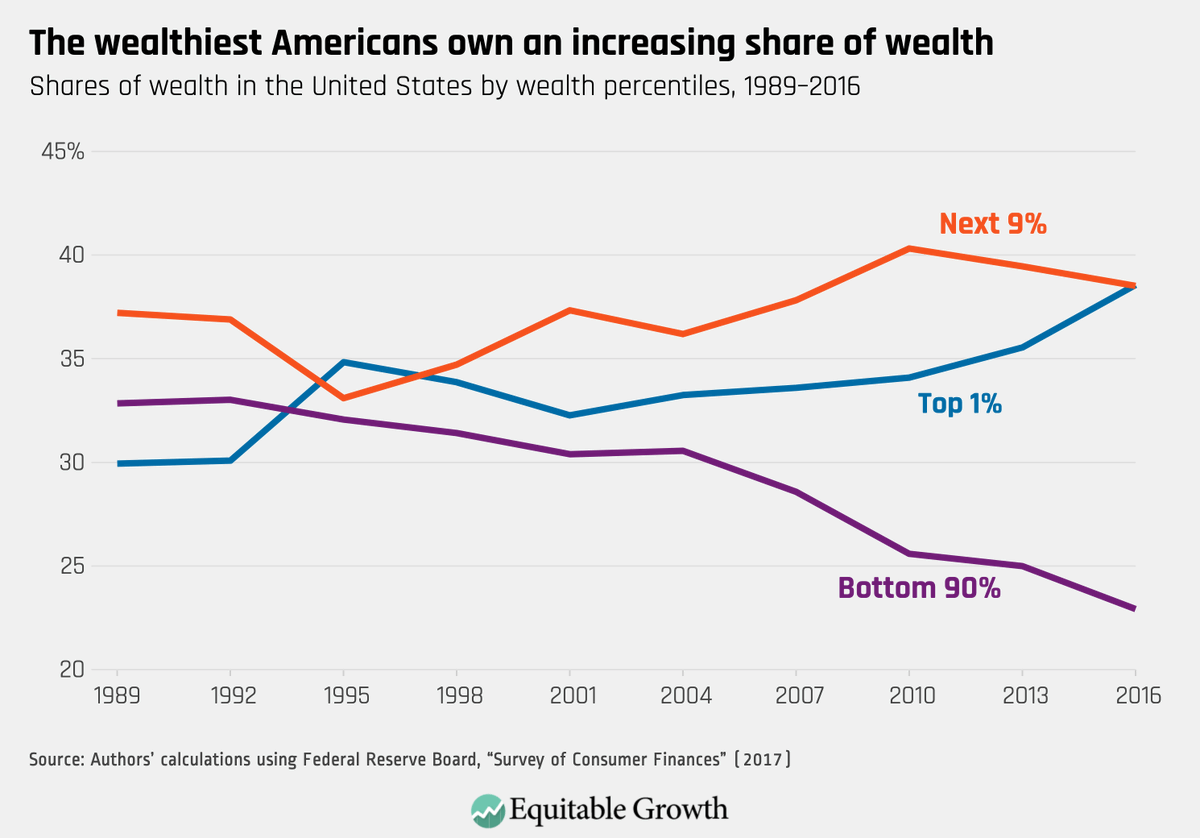Capitalism and inequality: A thread 1/x
Anyone observing capitalism can see it’s highly unequal and that this inequality is grossly unfair, and that it leads to poverty and misery for the many.
Anyone observing capitalism can see it’s highly unequal and that this inequality is grossly unfair, and that it leads to poverty and misery for the many.
Here’s a visual representation of how that inequality manifests in housing: https://twitter.com/MikeKofiA/status/1330962695705726980">https://twitter.com/MikeKofiA...
Inequality in the US has been increasing rapidly in recent years
https://equitablegrowth.org/the-distribution-of-wealth-in-the-united-states-and-implications-for-a-net-worth-tax/">https://equitablegrowth.org/the-distr...
https://equitablegrowth.org/the-distribution-of-wealth-in-the-united-states-and-implications-for-a-net-worth-tax/">https://equitablegrowth.org/the-distr...
What separates people politically is what should be done about it. Conservatives / reactionaries typically say ‘nothing’, arguing that inequality is necessary for risk-taking, innovation, etc.
In my field, the classic version of the conservative argument is Okun’s “Equality and Efficiency: The Big Tradeoff” https://www.brookings.edu/book/equality-and-efficiency-the-big-tradeoff/">https://www.brookings.edu/book/equa... -- let me know if you’re interested in a point-by-point takedown of this crappy, massively over-hyped book
What about liberals? The great reformer of capitalism John Maynard Keynes, puts it this way: “The outstanding faults of the economic society in which we live are its failure to provide for full employment and its arbitrary and inequitable distribution of wealth and incomes.”
Here is the link to the quote: https://www.marxists.org/reference/subject/economics/keynes/general-theory/ch24.htm">https://www.marxists.org/reference... -- this economic classic is actually worth reading
Liberals, following Keynes, argue government ought to institute policies which reduce inequality, but retain the private ownership of the means of production and all the property rights which have led to great riches for the few.
The preferred means are usually taxes on the rich, either progressive taxes on high incomes (i.e. high income earners pay a higher *PERCENTAGE* of their income than do the poor), perhaps combined with zero (or even negative) taxes on the poor,
along with government welfare programs such as food stamps, housing assistance, and some health care coverage.
This was the liberal consensus that emerged in the post-WW2 period and remained for the era of the capital-labor accord in the US and Europe, roughly 1945-80.
This was the liberal consensus that emerged in the post-WW2 period and remained for the era of the capital-labor accord in the US and Europe, roughly 1945-80.
Of course some countries implemented more of this agenda than others, e.g. Sweden.
Marxists see this as inadequate a solution for inequality as a band-aid on a massive gunshot wound. The problem with these liberal reforms to capitalism is:
(1) They are often barely adequate to reduce poverty, and leave significant inequality unaddressed;
(2) Without the threat of a workers’ revolution, these reforms would never have happened. (The 1st state to implement these reforms was Germany under Bismarck, who admitted that the welfare state was a response to rising militancy of socialist orgs, & an attempt to contain them);
(3) As we have seen, a counter-revolution which removes or attenuates these relatively meagre pro-equality policies can happen, as the UK under Thatcher or the US under Reagan (and every president since) amply illustrates.
Perhaps the reason is that, while such liberal policies can slow or reverse some of the inequalities of capitalism, they leave the basic mechanism that generates them untouched. The rich have accumulated their fortunes through theft of land and other resources,
through inheriting wealth accumulated by earlier generations of exploitation, often achieved through slavery and colonialism, or through the theft of surplus labor, and they maintain their wealth through the myriad methods of siphoning surplus value from workers,
some of them direct, such as being a capitalist employer, some very indirect, such as stock dividends or bond yields.
Marxism offers a much simpler system: the state appropriates the means of production, which includes the land, factories, equipment, and infrastructure that is used to produce things.
Using central government control over prices, the state can then ensure first that all have access to a decent life in terms of income, housing, healthcare, etc. The basic problem of inequality is solved, and the mechanism which produces it has been altered.
However, other problems remain. The state, in wielding power, may become a way to accumulate greater wealth and privilege, but there’s a far more important issue.
Marxism has far more ambitious goals than reducing the inequality of exploitative societies.
Marxism has far more ambitious goals than reducing the inequality of exploitative societies.
The central goal of Marxism is the creation of communism, a stateless, classless, commodity-less society which has abolished exploitation. (Marxism defines exploitation rather narrowly, as the taking of surplus value by those who did not produce it.)
Exploitation obviously does not magically appear just because there is only one employer, the state, which is why Lenin referred to the results achieved in the USSR in the early 1920s as ‘state capitalism’.
Lenin did not say this as a pejorative (as some modern leftists do), but as an acknowledgement that it was a first step, a necessary one, but not the last one.
Sadly, this experiment ended with the destruction of the USSR, to which the US greatly contributed, supporting a coup by Yeltsin that involved suspending the constitution & outlawing the Communist Party, as well as violently suppressing pro-socialist protests, killing thousands.
A good reference on this is Parenti& #39;s Blackshirts and Reds https://eastsidemarxism.files.wordpress.com/2017/04/michael-parenti-blackshirts-and-reds-rational-fascism-and-the-overthrow-of-communism.pdf">https://eastsidemarxism.files.wordpress.com/2017/04/m... (see pp 87-104)
However, we can conclude that the statist mechanisms that the Soviets (and other socialist states) employed were effective at reducing inequality and dramatically improving the quality of life, especially for the very poor.
And on this basis, the Soviet experiment was ruthlessly attacked by the West. We should not conclude from this that socialism failed, for it had barely begun. Socialism was strangled in its infancy in the USSR.
But the impulse to create a decent society that actually delivers on the liberal promise of equal opportunity for all will not go away.

 Read on Twitter
Read on Twitter


